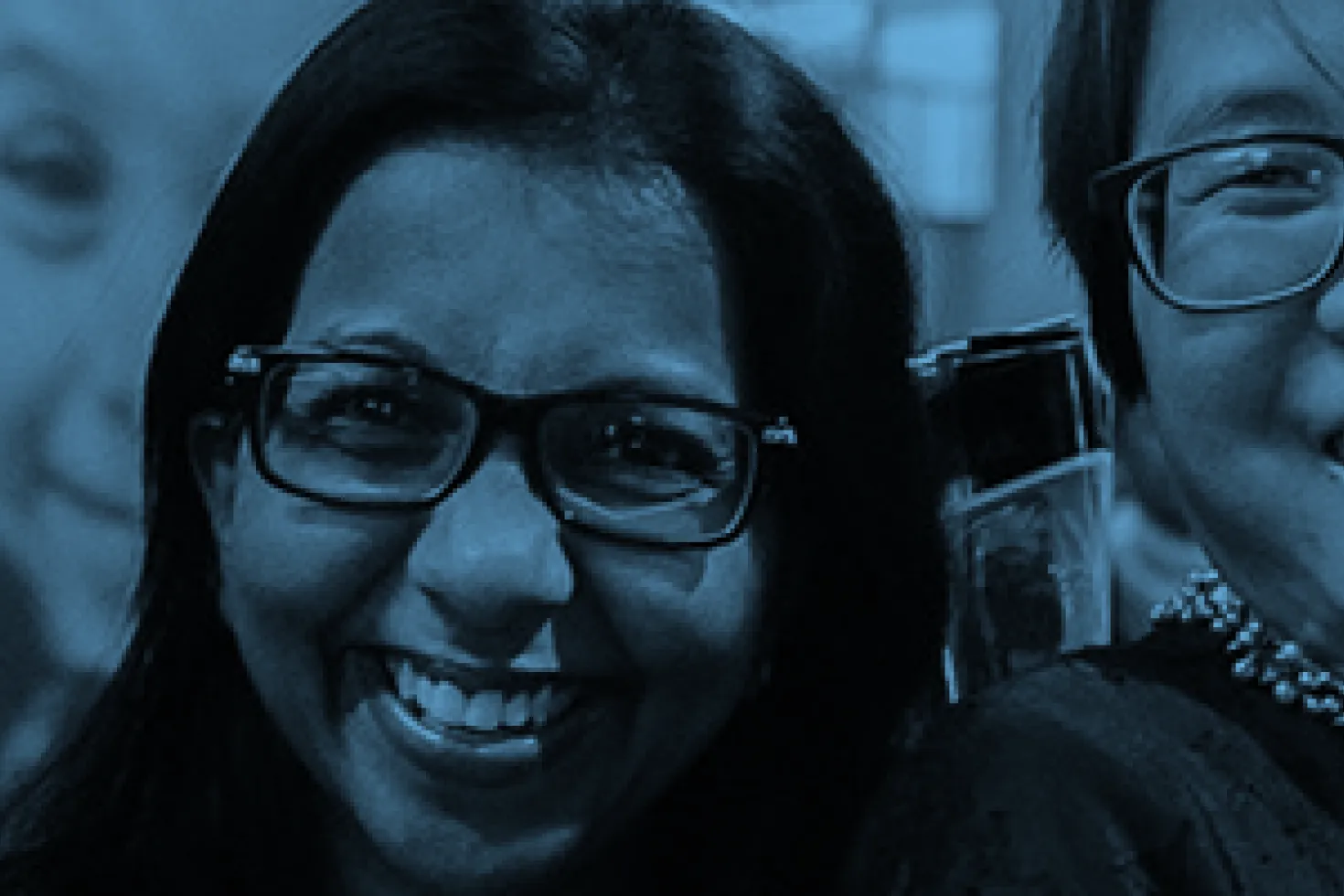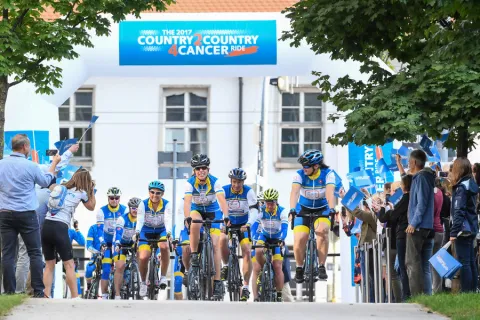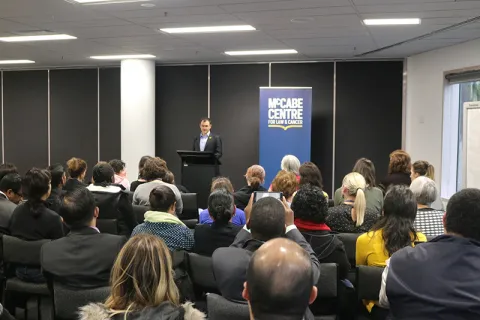Leveraging complementary assets case studies
UICC Member Cancer52 is an alliance of more than 80 organisations focusing on rare cancers in the UK and working to improve outcomes for patients with these highly challenging diseases.

UICC members and cancer patients across Europe benefit from an epic European cycling event

In 2017 Cancer52, together with other six UICC members, was selected as the beneficiary of an employee giving campaign organised by UICC’s partner, Bristol-Myers Squibb (BMS), where BMS employees from across Europe rode over 3,600 km from Germany to the UK. All funds raised by the BMS riders (which totalled over 80,000 Euros), was disbursed across the different UICC beneficiary members. Specifically to the UK, the funds were allocated to Cancer52 who was able to benefit from this opportunity and receive additional funding that allowed more attention to be place on most rare cancers within the UK.
This is a great example of international collaboration across UICC members and partners who provided the opportunity for different cancer organisations across Europe to raise funds for their specific activities and programmes.
As Jane Lyons, CEO of Cancer52 explains:
"Cancer52 was thrilled to be invited by UICC to be a partner in this ride, undertaken by so many dedicated bike riders from within the BMS team. We worked very happily alongside BMS in promoting the ride on social media and through our networks and we were very proud to be invited to the BMS employee event at their office in London on 25 September to welcome the riders home. This is a fantastic contribution to a small charity like us and will go towards our work on ensuring that the recommendations within the NHS England Cancer Strategy that are particularly relevant to rare and less common cancers are met."
A member to member international collaboration example
A great example of collaboration between UICC members is that of MAKNA (Malaysia) and Bright Future Foundation (Vietnam).
MAKNA’s mission is to mobilise resources in order to provide curative, preventive, research and support services to cancer patients and their families, high-risk groups and the general public, in Malaysia and the region.
MAKNA chose to collaborate with Bright Future Foundation as Vietnam has one of the highest death rates of cancer in the world, with 71% of cancer patients dying from the disease.
In a developing country with almost 90 million people MAKNA have a unique chance to contribute to a cancer infrastructure that will grow to cope with Vietnam’s rising cancer rates. Because of the vast population and poor reach of information in the most rural areas, the scope for assistance in the fight against cancer in Vietnam is huge.
In urban areas the problem is overcrowding. The national K hospital in Hanoi has 570 beds but, on a daily basis, holds around 500 patients. Oncology centres in provincial capitals such as Hue, Can Tho, Da Nang and Ho Chi Minh City face similar problems whilst in rural areas the problem is travelling to the local clinic can be costly and when there, they are likely nor to have the training or facilities to handle cancer.
MAKNA and Bright Future are both UICC members and the collaboration has brought huge benefits for both.
“In Vietnam, we have made increasing progress by cementing collaboration with the Bright Future Foundation, Vietnam. We have been operating in Vietnam for the past two years, focusing on community development, supporting the development of the Vietnamese National Cancer Registry, advocating anti-tobacco policies and training students of Hanoi Medical University on breast cancer screening.”
McCabe Centre and tobacco policy work

This case study portraits how the UICC working alongside a member organisation created a successful initiative that now translates into international impact combining cancer and the use of law.
The McCabe Centre for Law and Cancer is a joint initiative of Cancer Council Victoria and the Union for International Cancer Control. It is a leader in international legal training and capacity building across the spectrum of cancer prevention, treatment and care. The Centre also actively works to support the WHO Framework Convention for Tobacco Control, responding to legal threats or lawsuits from the tobacco industry.
There was a clear gap in international tobacco litigation and the Cancer Council Victoria identified the gap set by the WHO Framework Convention on Tobacco Control (FCTC), a treaty negotiated under the auspices of WHO and adopted by the World Health Assembly in 2003. It now has 178 Parties. Under the treaty, Parties commit to a range of measures dealing with demand reduction, supply reduction and international cooperation (including reporting).
Law has long played a central role in tobacco control. This includes the adoption of legislative or regulatory measures providing for, for example, smoke free workplaces and public places, mandatory health warnings and product information, and bans on tobacco advertising, promotion and sponsorship; litigation against the tobacco industry by individuals and governments over its conduct, or by employees and members of the public against employers and occupiers of public places over exposure to tobacco smoke; or litigation by the tobacco industry in domestic and international fora to challenge tobacco control measures.
The McCabe Centre performs the functions of a WHO FCTC Knowledge Hub on matters within its expertise, in particular legal challenges to implementation of the WHO FCTC, pursuant to a Memorandum of Understanding between the Convention Secretariat and UICC. Through the McCabe Centre Knowledge Hub website, parties and interested partners can find information regarding the WHO FCTC, State obligations under international trade and investment law, and the relationships between them. The Knowledge Hub site also provides information on ongoing trade and investment challenges to implementation of tobacco control measures. It is the only centre of its kind in the world. It was established to make an impact on cancer globally by using the law.
Cancer Council Victoria CEO Todd Harper has seen the benefit of the Centre’s work both internationally and locally, saying it has contributed to a wide range of law reform activities in Victoria.
“The work of the Centre has been instrumental in working with government to protect people with cancer against exploitation by providers of unregulated and unproven ‘treatments’, and laws to support people to plan for their end-of-life care and ensure that their wishes are respected,” he said.
“While these issues may not spring to mind when thinking about cancer control, they help to improve the lives of those diagnosed with cancer, and ensure patients are given every opportunity to make decisions about their treatment and care.”